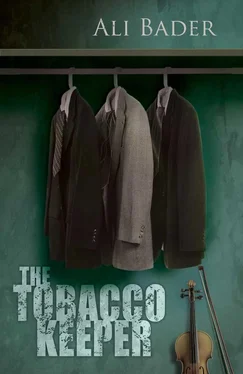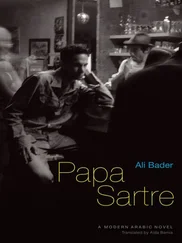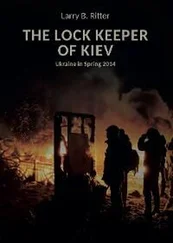So ended Farida’s letter.
Before retiring to bed, I sat on the balcony listening to the silence of the Green Zone. I looked at the wide streets, the lavish palaces and the reception halls built in the style of the Palace of Versailles and surrounded on every side by impregnable walls. As I looked out, slowly smoking my cigarette, I could make out the glaring lights of the surrounding buildings while all of Baghdad slept in darkness. From my position on the balcony, I saw a journalist reading a book and, through their windows, a politician talking on the phone and another person writing reports.
Some of the buildings were illuminated, while others were sunk in total darkness. In the dark I could make out something that looked like a tank. I also saw some men sitting in a tent playing Risk , smoking hookahs and drinking beer.
That evening I started to write about Kamal Medhat. I was motivated by my visit to Kamal Medhat’s house at Al-Mansour, where I’d discovered Pessoa’s poem, to divide the biography into three sections: the keeper of flocks, the protected man and the tobacco keeper.
From the life of Yousef Sami Saleh (1926-55)
‘I believe in the world like I believe in a marigold,
Because I see it. But I don’t think about it.
I have no philosophy, only feelings.
… There’s metaphysics enough in not thinking about anything.’
from Tobacco Shop
The Keeper of Flocks, Alberto Caeiro
The life of the musician, kitsch politics and foreign enemies
‘Isn’t there more to life than finding oneself a complete stranger among other complete strangers?’
This was what Yousef wrote in one of the most beautiful postcards he sent to his wife Farida from Tehran towards the end of April 1956, when he was in total despair. The postcard showed the harsh landscape of the huge Elburz Mountains. This short line was like a stifled scream in the midst of an infinite emptiness.
The line reminds us forcefully of Alberto Caeiro’s words when he says: ‘The windows of my room, a room that belongs to an unknown person among the millions of unknown people in the world. And even if he were known, what could possibly be known about him?’ I remembered this passage as I listened to Kakeh (‘Mister’) Hameh. With his nasal voice, thick lips and huge nose, he spoke with the enthusiasm of a priest about a long period of travelling and wandering, and of one city after another. He spoke vigorously, his eyes sparkling, his face unshaved, the ends of his white moustache shaking.
I ought to provide some information about this man. He was a Kurdish communist, and was conspicuously short and stocky. The oversized suit that he wore for our meeting, although fairly elegant, made him look almost comical. His hair was milky white and dishevelled and his large eyes darted about. It was clear that he rarely shaved.
Many people had a high opinion of him despite his incessant babble and tactless remarks. His passion for talking led him to dominate conversations. His Kurdish accent gave his Arabic a cetain beauty and eloquence. With his flamboyant style, his undulating voice, his intonation and local accent, he was often very amusing in telling Yousef Sami Saleh’s story. His narrative made the character of this brilliant but childlike musician fascinating. Kakeh Hameh kept me listening for hours, like a leech stuck to a plant.
Kakeh Hameh was Kamal Medhat’s friend, who had known all three of his personalities. He turned out to be one of the strangest characters I’d ever come across; strange in almost every respect. Because he knew a great deal about Yousef Sami Saleh and had been his companion for a long time, I sat with him until late at night. What had driven me to contact him was one of the comments Farida had written in the margin of a letter dated August 1956, that is, during Yousef’s residence in Tehran. It was this letter that made me start looking for Kakeh Hameh in the first place. I thought it would be appropriate for me to meet him before travelling to Tehran.
I had no idea why Kakeh was so happy as he told the story of Yousef Sami Saleh. He was profoundly content, like an insect warming itself in the sun. As he spoke, he waved his short arms left and right. Behind him was a photograph showing him in an elegant outfit, while beside him stood a beautiful woman wearing a colourful Kurdish dress. From time to time, as I listened to him evoking the past, I looked at the picture behind him. His conversation had the smell of old cupboards and drawers, of cold wooden chairs. I noted down in my small notebook various names, cities and major airports in the north and south of the country.
Kakeh Hameh was being very friendly. It gave him great satisfaction to recount the remarkable chain of events. He seemed to be following the same sequence as the letters in Boris’s envelope, which I’d arranged in date order. It was as if he’d sat me down on a stool in front of a peep box and was showing me scenes from a life that had gone forever. I tried hard to note down all the details without missing anything. There were new names, dates, cities, transformations and endless travels. It was a real journey for me, a journey that turned names into destinies and transformed our world into an incredible fantasy.
Was he talking about Alberto Caeiro, the keeper of flocks, the first of the characters that Pessoa had assumed for himself in Tobacco Shop ? For Yousef Sami Saleh was as innocent as Caeiro; he contemplated things with his eyes and not with his mind. Wasn’t Caeiro just the same? Furthermore, Yousef didn’t come up with any great ideas when he gazed at the objects around him. His view of things was profound but neutral. He captured things with his feelings but never questioned anything. This great musician, like the poet Pessoa, accepted the world quietly and serenely, accepted it for what it was, far from any metaphysical complexity. His life had no hidden agenda, he was a wide-eyed child among the infinite formations of nature. There was little doubt that Yousef Saleh’s character stood in stark contrast to his two subsequent personae: Haidar Salman and Kamal Medhat. While the second character was connected with symbolic forms (like Ricardo Reis in Tobacco Shop ) and the third was attached to the sensual (like Álvaro de Campos), the character of Yousef Saleh believed in nothing. Such was the first persona of the musician, the one that carried the name of Yousef Sami Saleh and whose death certificate was signed in 1955, the year Haidar Salman’s persona was born. It was strange that the character of Alberto Caeiro, who was born in Lisbon in 1889 and died of tuberculosis in 1915 after publishing his collection of poems The Keeper of Flocks, should have his biography written by Álvaro de Campos, the third assumed personality of Pessoa. When I later investigated the life of the Iraqi composer Yousef Sami Saleh, I discovered that his biography had been written by none other than Kamal Medhat.
So what was this character like?
Yousef was born in the Al-Torah quarter of Baghdad on 3 November 1926. His father, Sami bin Saleh, who came from the Qujman family, worked as an assistant at the Juri pharmacy in Al-Karradah. His mother was Huri bint Rahamin Dalal. Her father had been fairly wealthy in his early years, when he worked at the Spice Market and later at the Grocers’ Market in Baghdad. But in the aftermath of World War I, he’d fallen on hard times. His slightly tattered childhood photograph portrayed him as a small boy with delicate features and black hair falling on his forehead. He wore shorts and a large white shirt over his skinny body.
Читать дальше












